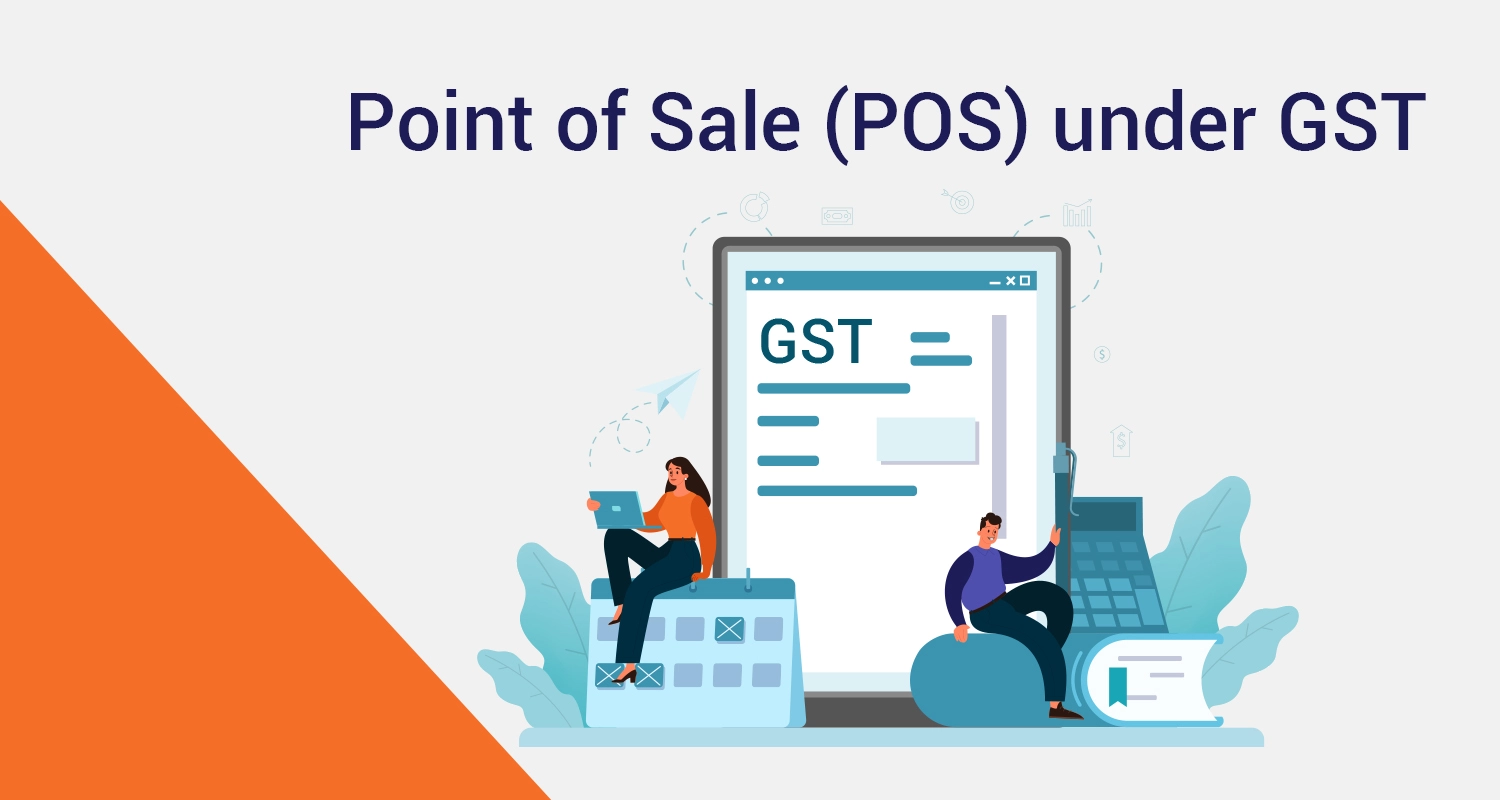Point of Sale: Meaning, Importance and Challenges
Table of Contents
Understanding the Point of Sale (POS) under the Goods and Services Tax (GST) system is crucial for businesses and consumers. POS plays a significant role in determining the tax jurisdiction for transactions and ensuring the correct application of GST rates. This article will explain the meaning of the Point of Sale, its importance under GST, and how it affects various types of transactions.
What is the Point of Sale?
Point of Sale (POS) refers to the location where a sale is completed. In simpler terms, it is where the exchange of goods or services for money occurs. This could be a physical location, like a retail store, or a virtual one, like an online shopping website. The POS is where the final transaction occurs and the invoice is generated.
Point of Sale in GST
Under the GST regime, the concept of Point of Sale is vital because it helps determine the Place of Supply, which dictates the applicable GST rates and the state or union territory entitled to the tax revenue. GST in India is a destination-based tax, meaning it is levied at the place where the goods or services are consumed, rather than where they originate. This is where POS under GST becomes relevant.
Point of Sale Meaning in GST
In GST terminology, the Point of Sale is where the goods or services are supplied. It is closely related to the Place of Supply under gst rules, which help identify where the tax should be paid. These rules vary for goods and services and depend on whether the transaction is intra-state (within the same state) or inter-state (between different states).
Determining the Place of Supply
To understand POS under GST, one must understand the rules for determining the Place of Supply. The Place of Supply rules are different for goods and services.
For Goods
- Intra-State Supply: If the supplier's location and the place of supply are in the same state, it is considered an intra-state supply. The applicable taxes are central GST (CGST) and State GST (SGST).
- Inter-State Supply: If the location of the supplier and the place of supply are in different states, it is an inter-state supply. The applicable tax is Integrated GST (IGST).
Sapna aapka. Business Loan Humara.
Apply NowFor Services
Determining the Place of Supply for services is more complex due to their intangible nature. The rules are categorized based on the type of service provided:
- General Rule: The place of supply is the location of the recipient if they are registered under GST. If the recipient is not registered, the place of supply is the location of the supplier.
- Special Cases: Certain services have specific rules, such as:
- Services related to immovable property: The place of supply is where the property is located.
- Restaurant and catering services: The place of supply is where the services are actually performed.
- Admission to events: The place of supply is where the event is held.
Importance of Point of Sale Under GST
The correct determination of the Point of Sale is critical for several reasons:
- Accurate Tax Calculation: Ensuring the correct Place of Supply helps in applying the right GST rate, whether it’s CGST, SGST, or IGST.
- Compliance: Proper identification of POS under GST ensures compliance with tax laws, reducing the risk of penalties and legal issues.
- Revenue Distribution: It helps accurately distribute tax revenue between the central and state governments.
- Transparency: It clarifies to businesses and consumers where and how taxes are being applied.
Practical Examples of POS Under GST
To further illustrate the concept, let’s look at a few examples:
Example 1: Sale of Goods
- Scenario: A seller in Maharashtra sells goods to a buyer in Gujarat.
- Determination: Since the supplier is in Maharashtra and the place of supply (buyer’s location) is Gujarat, this is an inter-state supply.
- Applicable Tax: IGST will be applied.
Example 2: Service Provision
- Scenario: A registered consultancy firm in Delhi provides services to a registered client in Karnataka.
- Determination: The recipient is registered and located in Karnataka, so the place of supply is Karnataka.
- Applicable Tax: IGST will be applied since it is an inter-state service provision.
Example 3: Restaurant Services
- Scenario: A restaurant in Mumbai serves food to customers.
- Determination: The place of supply is Mumbai, where the service is actually performed.
- Applicable Tax: CGST and SGST will be applied since it is an intra-state supply.
Challenges and Solutions
Challenges
While the POS rules under GST aim to simplify tax determination, they can be challenging in certain scenarios, such as:
- Multiple Locations: Businesses operating in multiple states may find it difficult to track and apply the correct POS rules.
- Complex Services: Services that span across multiple states or involve digital transactions can complicate the determination of Place of Supply.
Solutions
- Automation: Using GST-compliant accounting software can help automate the POS determination process, ensuring accuracy and compliance.
- Expert Consultation: Seeking advice from GST experts or consultants can help navigate complex scenarios and ensure correct tax application.
Conclusion
The Point of Sale (POS) under GST is a fundamental concept that determines the Place of Supply for goods and services. Understanding POS meaning in GST is essential for businesses to ensure accurate tax calculation, compliance with tax laws, and proper revenue distribution. By following the Place of Supply rules, businesses can effectively manage their GST obligations and contribute to a transparent and efficient tax system. As GST evolves, staying informed about POS rules and leveraging technology can help businesses navigate the complexities of tax determination.
FAQs
Q1. What is the Point of Sale (POS) under GST?
Ans. The Point of Sale (POS) under GST refers to the location where the sale of goods or services is completed. It is the place where the final transaction occurs and the invoice is generated. The POS helps determine the Place of Supply, which dictates the applicable GST rate and the tax jurisdiction.
Q2. How does the Point of Sale (POS) impact GST calculations?
Ans. The Point of Sale (POS) impacts GST calculations by determining whether a transaction is classified as intra-state or inter-state. For intra-state transactions, Central GST (CGST) and State GST (SGST) are applied. For inter-state transactions, Integrated GST (IGST) is applied. Correct POS determination ensures accurate tax calculation and compliance with GST laws.
Q3. What are the rules for determining the Place of Supply for goods?
Ans. For goods, the Place of Supply rules are straightforward:
- Intra-State Supply: If the supplier and the place of supply (delivery location) are in the same state, it is an intra-state supply, and CGST and SGST are applied.
- Inter-State Supply: If the supplier and the place of supply are in different states, it is an inter-state supply, and IGST is applied.
Q4. How is the Place of Supply determined for services?
Ans. The Place of Supply for services depends on the type of service and the location of the recipient:
- General Rule: If the recipient is registered under GST, the place of supply is their location. If not, it is the location of the supplier.
- Special Cases: For certain services like those related to immovable property, restaurant services, and event admission, specific rules apply based on where the service is performed or where the property/event is located.
Q5. Why is understanding the Point of Sale (POS) important for businesses?
Ans. Understanding the Point of Sale (POS) is crucial for businesses because it ensures accurate GST application, compliance with tax regulations, and proper tax revenue distribution between central and state governments. It helps businesses avoid penalties and legal issues and clarifies tax liabilities for transactions.
Sapna aapka. Business Loan Humara.
Apply NowDisclaimer : The information in this blog is for general purposes only and may change without notice. It does not constitute legal, tax, or financial advice. Readers should seek professional guidance and make decisions at their own discretion. IIFL Finance is not liable for any reliance on this content. Read more




